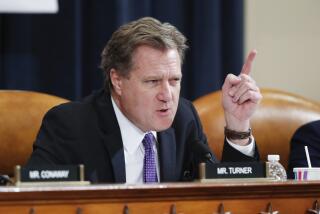U.S. Aides Doubt Soviets Will Use Yurchenko Case to Upset Summit
- Share via
WASHINGTON — Initial White House fears appear unfounded that the Soviet Union might exploit the case of KGB official Vitaly Yurchenko at the Geneva summit as an example of U.S. human rights abuse, White House officials said Thursday.
The issue came up only in passing during Secretary of State George P. Shultz’s two days of pre-summit talks in Moscow this week, which included extensive discussions of human rights, the officials said.
Yurchenko, who said he was kidnaped in Rome and drugged by CIA agents, flew back to the Soviet Union on Wednesday after spending more than two months in the United States as an apparent defector.
But the Administration is determined not to let the spy scandal upset the summit, despite the fears of some advisers that Soviet leader Mikhail S. Gorbachev may be saving it as “a trump card” to play when he meets with President Reagan in Geneva on Nov. 19-20.
Also, suspicions by Reagan and others that the Soviets engineered the Yurchenko case to embarrass the United States before the summit also appear to have faded, officials indicated.
‘Stoking Propaganda Fires’
“There’s no obvious rationale why they would want to deliberately upset the summit,” one White House official said. “To the contrary, they’ve been stoking the propaganda fires.”
Criticism of the CIA’s handling of Yurchenko is rampant in the intelligence community, with former national security advisers Zbigniew Brzezinski and Richard V. Allen united in their condemnation of the agency’s performance. But the White House, with its eye on the summit, refuses to join the chorus.
“I don’t see any signs here anyone is ordering a headhunt” as a result of the case, said one top official, who spoke on the condition he not be identified. Reagan has said he will not order an investigation into the CIA’s alleged mistreatment of Yurchenko.
CIA Director William J. Casey is a favorite of the President and has weathered previous assaults on his handling of a number of issues, including unauthorized mining of Nicaraguan harbors two years ago.
“He is definitely one of the boys,” a White House adviser said of Casey. “No one would dare touch him.”
Administration officials agree that the CIA should “hold hands a little better” when dealing with an apparent high-level defector like Yurchenko, but they say they do not want the agency’s failings to become a cause celebre on the eve of the much-heralded summit.
‘Case Is Closed’
“As far as we’re concerned, the case is closed,” declared another top official.
Brzezinski, who served in the Carter Administration, said in an interview that he supports Reagan in his decision not to let the spy case unsettle the summit. But he assailed the way it was handled as “a naive, incompetent and stupid display by the CIA that probably precludes for a long, long time any defections to the U.S. by a KGB official.”
The former national security adviser said that the agency lacks the “human” intelligence--as opposed to the high-tech wizardry--that is essential to the proper handling of such a sensitive case.
CIA officials have admitted that “security was lax” when Yurchenko was allowed to wander off from a dinner last Saturday with his CIA case worker. And they have acknowledged that closer attention should have been paid to the fragility of his emotional state as he rethought his apparent decision to defect.
‘Abysmally Insensitive’
Indeed, Brzezinski said the agency behaved in such an “abysmally insensitive and incompetent” manner that it is likely to cost the United States “some windfalls in the future” in terms of high-level defections.
Likewise, Allen, who was national security adviser early in Reagan’s first term, also was critical. “The agency at the operational level is culpable of neglect, to put it charitably,” he said in an interview. “If I called (Casey) up, he’d say there’s no explaining this and no excusing it. I hope Bill will discipline the proper people.”
Despite their intention to close the book on the Yurchenko affair, Reagan’s advisers are concerned that the Soviets yet could turn it to their advantage in Geneva. Noting that the Shultz-Gorbachev meetings in Moscow this week apparently did not go well, one official worried that Gorbachev may try to “run roughshod” over Reagan the way he reportedly did over Shultz.
In that context, said this official, the Yurchenko case is “a trump card that Gorbachev can play” during his eight hours of scheduled talks with Reagan. “We’ve just got to watch that,” he said.
‘Out of Left Field’
White House officials said that news of Yurchenko’s decision to return to the Soviet Union hit them “like something out of left field.” But despite their private amazement, White House aides maintained a studied coolness when discussing the issue in public.
Deputy Press Secretary Larry Speakes repeatedly declared “No comment” when asked questions about Yurchenko or the CIA’s role in handling his case. And he stressed that the affair has prompted “no change in our attitude” as the summit approaches.
Indeed, officials said there are plenty of other issues more likely to disrupt the summit, beginning with Reagan’s commitment to his Strategic Defense Initiative, commonly known as “Star Wars.”
“I’ve never seen any evidence (the Yurchenko case) was going to derail the summit or color the atmosphere,” one top White House official said.
More to Read
Sign up for Essential California
The most important California stories and recommendations in your inbox every morning.
You may occasionally receive promotional content from the Los Angeles Times.













